Snow leopard taken off endangered list - but still 'vulnerable'
Although no longer at imminent risk of extinction, scientists are warning the Himalayan big cat is not out of the woods yet.
Thursday 14 September 2017 21:55, UK
The snow leopard is no longer considered an endangered species, according to conservationists.
After 45 years, the Himalayan big cat has been reclassified to "vulnerable" - although experts are warning there is still a high risk of extinction.
The change follows a three-year assessment by the International Union for Conservation of Nature, which found there are no longer fewer than 2,500 mature snow leopards in the wild.
In fact, it is believed that there are at least 4,000 roaming free - and some experts think this number could be as high as 10,000.
Because of the remoteness and vastness of their Himalayan habitat, covering 12 countries in Asia, scientists have only managed to survey a small part of the area they call home.
Peter Zahler, from the Wildlife Conservation Society, described the assessment as "difficult", adding: "It involves an enormous amount of work in some of the most remote and inhospitable regions of the world."
But new technology such as camera traps and satellite collaring have helped, resulting in better information about where snow leopards are and how far they range.
Challenges to the big cats' survival include poaching and loss of prey, as they are hunted for their thick fur and bones.
Among measures designed to boost numbers are an increase in the number of protected areas, and predator-proof livestock pens which stop local herdsmen retaliating when livestock is lost.
Mr Zahler warned: "Saying snow leopards are now 'vulnerable' rather than 'endangered' doesn't mean they're safe.
"It doesn't take much to make large predators disappear from landscapes.
"We've seen it happen over and over again around the world."





